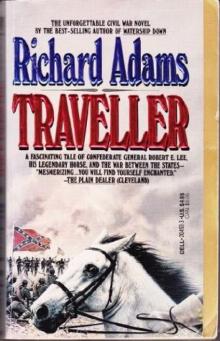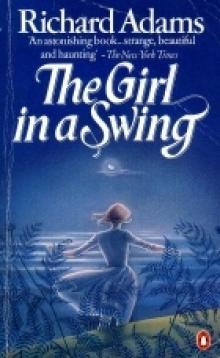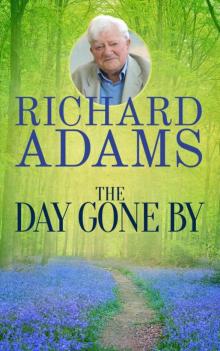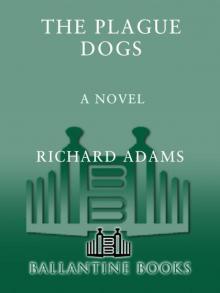- Home
- Richard Adams
Daniel Page 16
Daniel Read online
Page 16
Once the ship had been cleansed, the Captain took on board a cargo of colonial produce (which we loaded) and then assembled us and asked whether there was anyone who did not wish to sail back to England in the Frisky Shark. Two of the sailing crew stood down and the Captain paid them off there and then. All the so-called “slave-conductors” remained with the ship which, after three days of internal repairs by carpenters, set sail for home.
The crossing was uneventful and upon our arrival at Bristol the Captain took all of us with him to his bank. I had been wondering what he had done with the presumably large sum for which he had sold the slaves in Jamaica. While we were all waiting to be paid, I saw him give the bank manager (with whom he was obviously persona extremely grata) a bill of exchange which I guessed to be a transfer of the slave-money.
I opened an account with the bank and paid in, all but ten pounds, the almost unbelievable sum agreed with the Captain over the whisky so many months before. Although I now knew him for a desperately wicked man, for appearance’s sake I shook hands with him and wished him well. Then, after saying goodbye to Thorn, to my former companions and even to Wilkins, I stepped out into the street to embark upon what I now knew would be my true occupation.
* * *
As I strolled unhurriedly up into the City, enjoying the sensation of my feet being back on dry land, I noticed a church on the opposite side of the street. I was no churchman and had never had recourse to prayer. Missus Kathy had never taught me anything about it. But now I found myself thinking that if ever there had been a cause in need of the prayers of its adherents, it was surely the abolition of the slave trade. A prayer, I thought, even from a pagan like me, could not come amiss; and besides, I myself, as one about to engage in the struggle, needed to feel that God was with me. I had better ask Him.
I crossed the road and made my way up to the door. It was not locked and I went in. The church was empty; a hollow, vacant place it seemed, echoing as I shut the door behind me. I was not used to churches, but at least I knew that the altar stood at the far end. Rather timid — of what? — I went forward up the nave, into the choir, knelt down at the altar rails, clasped my hands and shut my eyes.
Then came doubt and hesitation. I had got it right so far, and if God wasn’t here then He wasn’t anywhere. What ought I to say to Him? The question was answered by my own spontaneous recollections. No need for words. There rose before my inward eye the black women begging for mercy on the beach at Lekki and myself taking the whip to them; the stench of the hold full of slaves; the dead bodies hauled up to the deck; Wain leading the hopping “dance”; Wilkins helping enthusiastically to throw live bodies overboard; and the scramble in the slave-market in Jamaica.
Now my tears fell. Between sobs I was uttering words. Loud and incoherent, they rose up of themselves like a spring from the rocks. “Forgive. Help. Come Yourself, Omnipotent. Fight beside me. Evil. Wickedness. Cruelty. I need You! Lord, I dedicate myself. Never forsake me. Promise, promise! Need. Help. Friend.”
All my thoughts, all I wanted to tell God, everything I needed to beg for poured from my heart.
I ceased. I felt quiet of mind. In the silence there was no one but God and myself. I longed never to leave this timeless silence, this now everlastingly present.
I remained kneeling at the rails in a gradual returning. I must return to the great cause, and now I had no doubt that it was blessed. I rose from my knees, turned and went slowly down the choir steps into the nave.
“What are you doing here?”
A man – a man I had not noticed – a clergyman – was at my elbow. There was no warmth or greeting in his voice. I groped for a reply.
“What are you doing here?” he repeated captiously.
Although he spoke like one in authority, I felt undaunted. If I had been a white man, I thought, he wouldn’t have spoken to me like this.
“I have been praying, sir,” I replied, “about a matter of personal importance.”
“That some gamble of yours may succeed, I suppose,” said he. “Why were you making such a noise? I could hear you outside the church.”
“I was not conscious of making a noise, sir. I am sorry. I assure you I meant no irreverence.”
“Are you sober?”
“I don’t have to answer your questions, sir. I will leave you.”
Before he could speak again, I turned on my heel and went, taking care to close the heavy door noiselessly behind me.
Having walked on for a while, it occurred to me that I had better get a room for the night. Looking about for a lodging house I caught sight, not far off, of a sign hanging from the first floor of some premises that had the look of a modest but respectable place.
Going in, I found myself in a small front hall that impressed me favourably, being clean, tidy and panelled to about three feet from the floor. After waiting for a short time, I was about to call out when a pleasant-looking, middle-aged woman appeared and bid me good morning in a rather reserved manner. Having replied, I told her that I would like a room for the night.
“Certainly,” she said. “The first floor front’s vacant, as it happens. Is it for your master?”
“No,” I answered. “It’s for myself.”
“I’m sorry,” she replied. “We don’t cater for black people at all.”
Feeling my temper rising, I bit my lip and searched for something to say.
“If you’re going to make trouble,” she said, “I’ll fetch Mr. Travers to speak to you.”
“No,” I managed to reply. “There’s no need. Good morning.”
On the step outside, I trod in some dog shit I hadn’t noticed before.
As I left the “No Blacks” lodging house behind me and walked on down the street, I saw for myself quite a few black people going about their daily concerns. I stopped one of them, asked him for guidance and added a few words about my recent experience at the lodging house. He replied that I was in the wrong part of the city, “full of bloody white lords of creation”, and told me where to go. His advice proved sound, and I put down a deposit for the room, left my baggage and, although it was not yet midday, treated myself to an early meal.
I then set about the real business of the day, which was to find out whether Bristol contained any number of people sympathetic to the cause of Abolition.
Having learned that the Member of Parliament was in London, I decided to try the Bishop. He was away too, but his chaplain, who proved friendly and talked with me for some time, gave me the names and addresses of several clergymen whom it might, he thought, be worth my while to visit.
That afternoon I managed to meet four of these gentlemen. None treated me discourteously and all declared themselves in favour of Abolition, but that was about as far as three of them went. Two plainly thought, (though they were too polite to say so), that I must be acting on behalf of some white person.
My afternoon’s work encouraged me to the extent that it showed that at least the idea of Abolition was not without sympathisers in Bristol. Two out of the four told me about someone called Thomas Clarkson.
“He’s the fellow for you,” said the Reverend Malcolmson, a pleasant man who was digging in his garden. “I’ve heard he’s devoted his life to the cause of Abolition. He’s quite young, I believe, but he’s getting talked about all right.”
“Where is he?” I asked.
“I don’t actually know, but somewhere in London, I suppose. That’s” (with a smile) “if he’s not somewhere else. He travels all over the country, speaking against slavery. Some of my parishioners think a lot of him. ‘Is it right to make men slaves against their will?’ That’s a publication of his. Perhaps you already know it?”
“I’m afraid I don’t,” I said. “But I’ve served on a slave-trading ship from Lagos to Jamaica and I’ve seen a lot — too much — at first hand. Do you suppose Mr. Clarkson has?”
We parted on good terms.
Next morning I called at the bank and provided myself with a hundred poun
ds. Then I bought two good suits and fitted myself out with everything else I needed — shoes, underclothes, shirts, an overcoat and so on. After that I paid to hire for the day a horse and trap with a driver, a matter over which I had no difficulty when I told the proprietor that I had business with Lady Penelope Marston, of Clepton St. Peter, with whom I had been in service.
We reached Clepton in the early evening. Having turned into the steep little approach from the road down to the stable yard, the first person I saw was Mr. Hodges attending to a horse I did not recognise. Looking up as we arrived, he actually broke into a smile.
“Where’ve you sprung from then, Dan’l? Bin on yer travels, ’ave yer?”
“I certainly have, Mr. Hodges; too far and too long.” I jumped down and shook hands. “I tell you, I’m more than glad to see you again. How’ve you all been going on? Everything the same?”
“More or less, I s’pose. Your black friends speakin’ English like a couple of monkeys but they ain’t turned out too bad, ’long as I makes it plain what they ’as to do.”
“Well, Mr. Hodges, I tell you, you’re the best friend I’ve seen since I left here. I’d better go in and make myself known. This a new horse you’ve got?”
“No, this is one of Mr. ’ardwick’s carriage ’orses. Only ’e’s stayin’ a few days, see?”
“Oh ah. Mr. Hodges, could you please do me a favour? This is my driver, who’s brought me from Bristol. Could you please look after him, give him something to eat, see to his horse and so on? We’ll be returning to Bristol later this evening.”
I tipped the man, left him to Hodges and went in by the back door. Mrs. Beddoes was alone in the kitchen except for Paul Chester, who was drinking a cup of tea.
“Well, I declare,” she said, “if it isn’t young Dan’l! ’Nice to see you again. You going to stay with us a day or two?”
“I hope so,” I replied. “But her Ladyship doesn’t know I’m here yet.”
Paul and I embraced and spoke warmly to each other.
“Now you’re here, you’d better have something to eat,” said Mrs. Beddoes. “Is Lady Penelope expecting you? No? Well, then, she won’t miss you while you have a bite, will she?”
Having had nothing since that morning, I was sharp set. I was still eating when Mr. Graydon came in and greeted me with his customary reserve.
“If her Ladyship doesn’t yet know that you’re here, Daniel,” he said, “you’d better wash your face and hands and come upstairs with me.”
At the drawing-room door he said, “Wait here.”
As he went in, he left the door slightly ajar, and I heard Lady Penelope’s voice.
“Daniel, Graydon? Not really?”
Next moment she was through the door and shaking my hand.
“I’m really glad to see you, Daniel. Come in. You remember Mr. Hardwick, don’t you?”
Mr. Hardwick, smiling, also shook my hand. “Do I understand that you’ve returned from travels abroad, Daniel?”
“I have indeed, sir,” I answered, “and I’m more than glad to find myself back home.”
At the far end of the room, a black boy of perhaps eleven or twelve, smartly dressed in uniform, was sitting in the window embrasure, knitting. Lady Penelope called him over.
“This is Philip,” she said. “Mr. Hardwick found him for me after you left. He’s doing well.”
I shook hands with Philip and said I was happy to meet him. He was shy and tongue-tied, but I quite liked the look of him.
Lady Penelope and Mr. Hardwick sat down and Lady Penelope motioned me to a chair beside her.
“Your Ladyship,” I said, “I’m sure you’ll recall that I’ve never sat down in the same room as yourself.” (This wasn’t quite strictly true, but near enough.)
“Well, I’m asking you to sit down now,” she said. “You’ll stay until tomorrow, Daniel, won’t you?” (Never mind about the booking at the inn.)
“Thank you, your ladyship. I’ll be delighted to.”
She sent the young page to tell Mrs. Beddoes that I was staying the night and that Hodges should be told to dismiss my driver. “And now,” she said, “tell us your story, Daniel.”
“Your Ladyship,” I answered, “I hesitate only because I’m afraid you’ll find it distressing.”
To this she made no reply, but only looked at me as she used to look when she was giving me an order.
So I began, starting from my first meeting with Hawkshot at Bristol, emphasising the large salary he was offering and my total ignorance of the African slave trade. I described the voyage to Lagos and then told of Ushumbo and the condition and desperation of the slaves he brought to the beach at Lekki. As I went on to speak of Jack Wain and the brutality with which the slaves were treated, I paused, feeling a growing tension in my listeners. However, they remained silent and I continued. I kept back nothing, telling how I gave in to Hawkshot and whipped the slaves myself. As I spoke of the hysteria of the naked, fear-crazed women, I saw that Lady Penelope was silently shedding tears. I asked her whether she would prefer me to stop, but she shook her head.
I recounted the heroism of Basil Townley and how he was handed over to Ushumbo. At this Mr. Hardwick broke in to ask what Ushumbo had done with him, and when I answered that I didn’t know, said that Hawkshot was a villain and deserved to be hanged.
I omitted nothing about the slaves lying in their own ordure on the floor of the hold, the daily search for dead bodies and the diminution of our own numbers as the voyage to Jamaica continued. At this Mr. Hardwick jumped to his feet, crying out “No more! No more!”
“Sit down, Francis,” said Lady Penelope. “If Daniel could endure it, we can hear it.” She herself had become calm, although her handkerchief was clenched tightly in one hand. “You have more to tell us, Daniel?”
“The worst, I’m afraid, your Ladyship.”
“Do you want to tell us?”
“As your Ladyship wishes.”
“Then go on.”
I spoke about the slaves thrown overboard alive but then, remembering the undertaking that I had given to Hawkshot, said nothing about his intention to claim insurance. Since it was I myself who had voluntarily initiated the promise, I felt bound to keep it. Finally I gave an account of the slave market and the “scramble” in Jamaica.
As I ended, both my hearers remained silent. I felt that I had still not told all that was on my mind, and at length blurted out, “I feel ashamed of giving in to Wain and Hawkshot. Basil didn’t give in and I ought to have done as he did, but I was afraid of what they’d do to me.”
Lady Penelope leaned towards me and laid a hand on my shoulder. “I don’t think you’ve very much to feel ashamed of, Daniel. A great many people – perhaps most people – would have done as you did.”
“I’m only glad you’ve got back safe and sound,” said Mr. Hardwick. “Your Captain Hawkshot, perhaps he could be hanged on your evidence. Do you think so?”
“I doubt it, sir,” I answered. “I think slave-traders stick closely together, and I’m sure Hawkshot would be able to bring Wain and Jarvis and a lot of other people to testify in his favour. Besides, sir, I have it in mind to pursue a different course of action.”
“What course?” asked Lady Penelope.
“Your Ladyship,” I replied, “I mean to devote myself, for the rest of my life if necessary, to the abolition of the slave trade. I’ve made some enquiries and I know I shan’t be alone. I’ve been told of a man named Thomas Clarkson who’s entirely committed to Abolition and speaks to audiences all over the country. I believe that my testimony — the testimony of a black man with my firsthand experience — could count for a lot with the public and also, perhaps, with Members of Parliament.”
“What’s your intention, then?” asked Lady Penelope.
“I mean to go and see Mr. Clarkson and offer him my full support. I shan’t need pay. I simply want to work alongside him, if only he’ll take me on.”
“I’ve been told that the Quakers are strong
ly opposed to slavery,” said Mr. Hardwick. “And that John Wesley fellow, too. You might try them. I’ll be going home tomorrow, and I can take you as far as Guildford and put you up for the night.”
I thanked him warmly.
“And now we’ll have supper brought in,” said Lady Penelope.
Two or three days later, having reached the village of Croydon, I went to see a certain Mr. Charles Winter, who, I had been told, was a respected local figure in the Society of Friends. Although he could not entirely conceal his surprise at a visit from an unknown black man, he received me courteously, invited me into his sitting-room and asked what he could do for me.
I explained that his name had been given to me as that of an active sympathiser with the Abolition movement. He responded at once that he, like every member of the Society of Friends, was strongly opposed to the slave trade, and asked what I might have to tell him.
I repeated my account of all that I had experienced under Captain Hawkshot from Lagos to Jamaica. Mr. Winter listened without interruption until I told him about the slaves being thrown alive into the sea. Here he broke in to ask whether I was certain of the truth of what I was telling him. When I had assured him that there was not the least doubt, he buried his face in his hands and said nothing more for a short time. I concluded that he was praying and waited in silence until he looked up at me and nodded. As I continued, he stood up, strode twice back and forth across the room and then, facing me where I sat, said that he could scarcely believe that any man could be so wicked. I told him that my experience had been decisive in determining me to devote myself to the cause of Abolition.
We conversed for some time, and he told me about Mr. James Ramsay, who, as a ship’s surgeon, had been sent aboard an English slave-ship in which the Plague was raging, and had seen appalling suffering. Subsequently he had lived for several years in the West Indies and had published an essay on the treatment of slaves in the sugar colonies. This, said Mr. Winter, was a vitally important contribution to the anti-slavery movement. Mr. Ramsay was one of the foremost figures in the cause. He had been cruelly attacked in the Press and even threatened with violence.

 Watership Down
Watership Down Tales From Watership Down
Tales From Watership Down Maia
Maia The Plague Dogs
The Plague Dogs Shardik
Shardik Traveller
Traveller The Girl in a Swing
The Girl in a Swing The Day Gone By
The Day Gone By Daniel
Daniel The Plague Dogs: A Novel
The Plague Dogs: A Novel